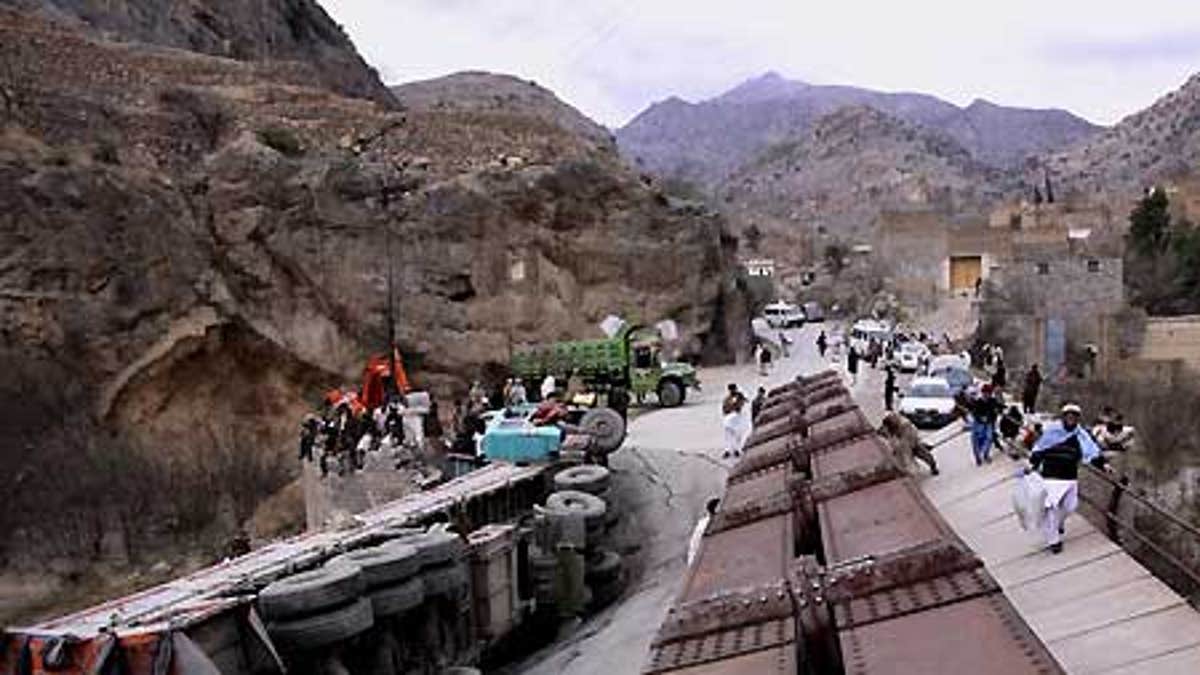
Feb. 3: A truck lies down on a bridge destroyed by alleged Islamic militants in the Pakistani tribal area of Khyber. (AP)
PESHAWAR, Pakistan – Militants blew up a bridge in northwest Pakistan on Tuesday, cutting the major supply line for U.S.-led troops in Afghanistan with an explosion that turned the narrow span into a jagged metal "V."
It was the latest, and perhaps most serious, attempt to block supplies to the U.S.-led mission against the Taliban.
The length of the slender metal bridge slanted to one side and was blocked by an overturned truck that spilled dozens of dusty bags into the pavement. Traffic from the bare hills continued on foot, with Afghans and Pakistanis, including women in burqas, hurrying their baggage over the dry riverbed.
A NATO spokesman in Afghanistan said supplies along the route had been halted "for the time being," but stressed the alliance was in no danger of running out of food, equipment or fuel.
The latest attack on the famous Khyber Pass highlights the urgent need NATO and the U.S. have for alternative supply routes to landlocked Afghanistan through nations to its north, especially as the U.S. plans to double its troop numbers in the country this year.
Up to 75 percent of the fuel and supplies destined for U.S. and NATO troops in Afghanistan travel through Pakistan after being unloaded at the port of Karachi, and most are driven along the Khyber Pass.
It was not immediately clear whether supply convoys could reach Afghanistan through alternative, smaller routes in the region. An official in the area, Fazal Mahmood, said repair work had begun on the bridge.
Hidayat Ullah, a government official in the Khyber tribal area, said the 32-foot-long bridge was about 15 miles northwest of the main city of Peshawar.
Pakistan has dispatched paramilitary escorts for supply convoys and cracked down on militants in Khyber, but attacks have persisted in an area that up to three years ago was largely free of violence.
U.S. Central Command chief Gen. David Petraeus said last month that agreements are in place to use supply routes that cut through Central Asia, but details have yet to be announced.
Underscoring the insecurity that plagues other parts of Pakistan, authorities said they were questioning 15 people in connection with Monday's abduction of an American U.N. worker John Solecki in the southwest.
They said the men, including several Afghans, were not considered suspects in Monday's kidnapping.
Solecki was kidnapped as he traveled to work in Quetta city in Baluchistan, a province that partly borders Afghanistan but has largely been spared the Al Qaeda and Taliban insurgency in the northwest.
The government called the abduction a "dastardly terrorist act." But police said it was not clear whether Islamist militants, criminals seeking a ransom payment or members of a regional separatist group were responsible.
"We have opened investigations, and our various teams are working on this case and the effort is to safely recover the man," said senior police officer Wazir Khan.
Solecki headed the Quetta office of the U.N. High Commissioner for Refugees, which has worked for three decades in the region helping hundreds of thousands of Afghans fleeing violence in their homeland.
The man who answered the door at the New Jersey home of Ralph Solecki, the father of John Solecki, said Tuesday the family would not grant any interviews.
Suspected militants have attacked or kidnapped several foreigners in recent months.
In August, Lynne Tracy, the top U.S. diplomat in the northwest, narrowly survived an attack on her vehicle in Peshawar by suspected militants. In November, also in Peshawar, gunmen shot and killed American aid worker Stephen Vance.
Quetta has been mentioned by Afghan officials as a likely hiding place for Mullah Omar and other Taliban leaders thought to have fled Afghanistan after the U.S. invasion in 2001.
Baluchistan is also the scene of a low-level insurgency driven by nationalist groups wanting more regional autonomy. They are not known to target foreigners.
Also Tuesday, someone threw a grenade inside a mosque in the northwestern town of Dera Ismail Khan, killing at least two people and wounding eight, officials said.
The grenade attack occurred in the evening as worshippers prayed, police officer Jehangir Khattak said. The city has witnessed increasing Taliban activity, but it also has a history of sectarian clashes between Sunni and Shiite Muslims.
At least two people died and eight others were wounded, said Ashiq Saleem, a doctor at a local hospital.
Meanwhile, at least 35 Islamist militants were killed in an overnight operation in Swat Valley, a former tourist area in the northwest that has been increasingly overrun with insurgents, Pakistan's military said in a statement.
